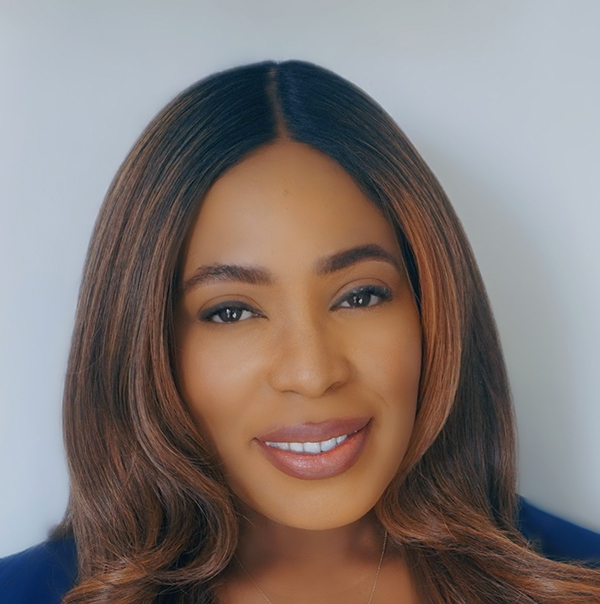Patricia Ahanda
Tue, 2021-06-01 16:03 — Amine.ElGaliIn her case, the same applies to geography. Born in France, Patricia Ahanda partly grew up in Cameroon, her parent’s country. When her father was posted in Yaoundé, his family followed. Between the age of 6 and 10, Patricia observed and absorbed her new environment. She dreamt of becoming a school headmistress. “I realized the importance of education in Cameroon. My father was helping a lot of children in need, to finance their studies. He thought it was unacceptable to let kids work on the fields or walk for kilometers to attend class. He told me to always help somebody to go to school, as much as I could”.
Cameroon has taught her life lessons : “People always fight in difficult circumstances, finding strength and inspiration”, she says. In France, “things are not easy either but this is a Revolution country with important values such as freedom and equality, and that also grants its citizens the right to protest . One can always criticize the French society, but the struggle against inequalities is deeply rooted. I find this reassuring, because it is not the case in other countries”.
Double culture, double curriculae
Her double curriculae in Politics and Communication is another facet of her personality. She has a Master’s Degree in Modern Litterature and Communication and another one in Geopolitics (Université Paris III). At first, she wanted to be a diplomat like her father. But she changed her mind after a traineeship at the French Embassy in Niamey (Niger) in 2010. “A troubled time, with French nationals being held hostages and a general context of financial restrictions in diplomatic institutions”, she explains.
She decided to study further at La Sorbonne (Paris I), with a Master’s Degree mixing Law, Political Science and preparation to the well-known National School of Administration (ENA). She never made it to this elitist school, now doomed to disappear under a decision of the President Emmanuel Macron. She nonetheless managed to get the needed skills to pursue her political carreer.
At 16, she started fighting for youth participation in politics with the Socialist Party (PS). In 2011, she joined the direction of the campaign team of François Hollande, elected in 2012. She became a member of the press relations’ team in the cabinet of the Minister of Economy and Finance.
Crying out for change
Between 2014 and 2020, she held an electoral mandate as a Deputy Mayor of Champigny-sur-Marne, a suburb of Paris with 76,000 inhabitants. She was in charge of the “digital development, training and professional insertion” for the youth and the unemployed.
Patricia Ahanda has a smooth voice, but everything about her is crying out for change. Her coaching firm, called Lydexperience, was launched in 2017 to fill a gap. “Everybody’s talking about governance and leadership, but nobody is teaching those subjects. My work experience has shown me that leadership is a skill you can acquire. It’s all about certain codes and customs that some people are not raised with. When knowledge and tools are shared, it becomes possible to democratize leadership, without thinking it belongs to the elite”.
She organizes trainings in the public sector, and gives advice to SMEs or people looking for leadership skills. What is the best asset to become a true leader? “Quality, the desire to do and share something, serve a cause, solve a problem, respond to questions or expectations of a group”.
Self-assertion as a young woman
Her customers are mostly women, looking for a self-assertive outlook that is often lacking. “There isn’t one model of leadership, and it does not necessarily look like a man in a suit. Leadership is also represented by strong women like Mother Teresa or Wangari Maathai. More and more women want to get trained after reading positive pieces about female success stories in the press”. She operates in France and Africa, offering a Women Leadership Workshop and a Brunch Women Leadership Business. Both initiatives were given in 2020 a label by UN Women and the Ministry of Gender Equality, during the forum called “Génération égalité”.
She is still working on the political front, and has launched in 2021 a new NGO called POLEADHER, focusing on the participation of young women in politics. Patricia Ahanda, a leader in her own right, has been a member of many programs - Globsec Young Leaders, the Most Influential People of African Descent (MIPAD), the Forbes Under 30 Summit and the World Bank Youth Summit, to name a few.
She was also an Atlantic Dialogues Emerging Leader (ADEL) in 2018, a program she thinks is “different, because I am still in touch with fellow young leaders from across the Atlantic”. She applied because she was longing to meet people “like me, living in other countries but sharing my aspirations and a will to have a positive impact on the world, with more exchange and cooperation”. In Marrakesh, she shared experiences with “people eager to learn and other young women finding it sometimes difficult to impose themselves”. Patricia’s future seems bright, rooted in questions of equality, education and development that won’t go away.










